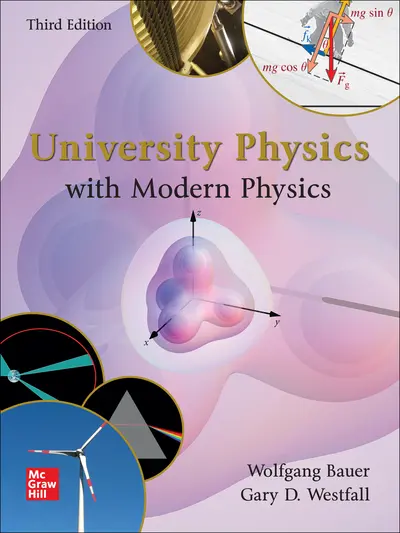My Account Details

ISBN10: 1266672621 | ISBN13: 9781266672620

* The estimated amount of time this product will be on the market is based on a number of factors, including faculty input to instructional design and the prior revision cycle and updates to academic research-which typically results in a revision cycle ranging from every two to four years for this product. Pricing subject to change at any time.
Instructor Information
Quick Actions (Only for Validated Instructor Accounts):
For instructors looking to engage students and enhance their problem-solving skills, choosing Bauer/Westfall’s University Physics, offers student-friendly, accessible content, tools, and resources that develop high-level problem-solving and critical thinking skills. University Physics with Modern Physics weaves exciting, contemporary physics throughout the text with coverage of the most recent research by the authors and others in areas such as energy, medicine, and the environment. These contemporary topics are explained in a way that your students will find real, interesting, and motivating.
University Physics with Modern Physics is available in McGraw Hill Connect, featuring SmartBook; curated, auto-scored assessment; full online experiments and simulations, STEM Prep modules, and more!
0. The Big Picture
Part 1 - Mechanics of Point Particles
1. Overview
2. Motion in a Straight Line
3. Motion in Two and Three Dimensions
4. Force
5. Kinetic Energy, Work, and Power
6. Potential Energy and Energy Conservation
7. Momentum and Collisions
Part 2 - Extended Objects, Matter and Circular Motion
8. Systems of Particles and Extended Objects
9. Circular Motion
10. Rotation
11. Static Equilibrium
12. Gravitation
13. Solids and Fluids
Part 3 - Oscillations and Waves
14. Oscillations
15. Waves
16. Sound
Part 4 - Thermal Physics
17. Temperature
18. Heat and the First Law of Thermodynamics
19. Ideal Gases
20. The Second Law of Thermodynamics
Part 5 - Electricity
21. Electrostatics
22. Electric Fields and Gauss’s Law
23. Electric Potential
24. Capacitors
25. Current and Resistance
26. Direct Current Circuits
Part 6 - Magnetism
27. Magnetism
28. Magnetic Fields of Moving Charges
29. Electromagnetic Induction
30. Alternating Current Circuits
31. Electromagnetic Waves
Part 7 - Optics
32. Geometric Optics
33. Lenses and Optical Instruments
34. Wave Optics
Part 8 - Relativity and Quantum Physics
35. Relativity
36. Quantum Physics
37. Quantum Mechanics
38. Atomic Physics
39. Elementary Particle Physics
40. Nuclear Physics
Appendix A. Mathematics Primer
Appendix B. Elements Properties
Appendix C. Multimedia Interactive Elements
Accessibility
Creating accessible products is a priority for McGraw Hill. We make accessibility and adhering to WCAG AA guidelines a part of our day-to-day development efforts and product roadmaps.
For more information, visit our accessibility page, or contact us at accessibility@mheducation.com
Affordability
Reduce course material costs for your students while still providing full access to everything they need to be successful. It isn't too good to be true - it's Inclusive Access.
Need support? We're here to help - Get real-world support and resources every step of the way.